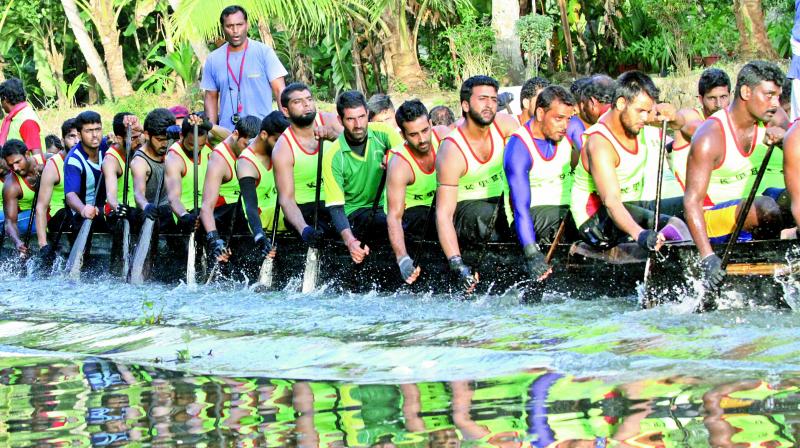Speed kings: Migrants power a boat race
With a decline in farming as a vocation, Kerala boat race has taken a hit.

Water in the Punnamada lake in Alappuzha catches fire on the “most scintillating second Saturday on the earth” when about 20 snake boats race in every August to win the Nehru Trophy Boat Race and lift the trophy, signed and sent by the first prime minister of the country 65 years ago. It’s the ultimate show of strength, stamina and skills by men in the Kuttanad region, where farming is undertaken on land below sea level, and country boats and rowing are a way of life. Kuttanad, sprawled over a 500-km-long coastline accommodating the biggest wetlands in the country, once boasted of land of envious oarsmen. And boat racing was this charming land’s USP for long.
But the scene has changed, and at a speed that overtakes the fastest of the snake boat. As time passed, the reputation has taken a hit; it became bereft of skilled rowers. As in many parts of the country, farming ceased to be a vocation that helped people live a decent life, forcing the youngsters to migrate to greener pastures leaving the boats and the race to their fate. But the spirit of race refused to die down, and local clubs found an alternative — They started bringing in oarsmen from other parts of the country. “It started six years ago,” said Jameskutty Jacob, who last year lifted the coveted trophy leading Karichal’s serpentine 153-foot race boat. Now, you would find oarsmen from many parts of India rowing at the annual race. They are from Manipur, West Bengal, Odisha, Bihar and even Jammu and Kashmir.
“The trend of outsiders appearing in the Nehru Trophy Boat Race started after super-rich non-playing NRI businessmen with roots in villages took over the cash-strapped local boat clubs,” says Joseph Elamkulam, a boat race commentator. “The criteria in recruiting outsiders are nothing but stamina and discipline,” says Rocha Chacko, a young oarsman from Kainakari who rows for New Aleppey Boat Club, maintaining that he has no qualms about leading a bunch of Kashmiri rowers. “They are better trained than us in dragon boat races, kayaking and canoeing. Most of them are trained by the Sports Authority of India and the Indian Army.”
Mr Jacob would also vouch for the oarsmen who helped him lift the trophy last year. “They are loyal and workaholics,” he said. “Kuttanad is facing dearth of trained hands, thanks to our laziness.” The guest oarsmen arrive at least a month before the race and join the training camp. Apart from food and accommodation, they would be paid handsomely. The pay begins at Rs 1,000 a day. Each training camp budget is around Rs 40-50 lakh. The rowers are provided nutritious diet of milk, eggs and meat daily. To top it, the club owners pay the rowers handsomely in kind.
“Kerala is full of friendly people,” said Mohammed Rafique who rowed for Town Boat Club Kumarakom this year. “We are from Srinagar. It was the love of the sport that has brought us to Alappuzha to participate in the competition. We would love to return next year as well.” Last year’s race even kicked up a controversy when as many as 60 of the 110 oarsmen in the winning team were non-locals. “We put a 25 per cent cap on migrant rowers this year,” says Veena N. Madhavan, Alappuzha district collector, who is also the chairperson of Nehru Trophy Boat Race Society, the organising body of the annual event.

